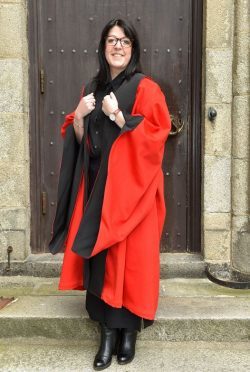Although not originally from Shetland, the Karam family moved to the islands when their daughter was four years old and her father got a job as a GP on Unst.
And now, Kerry Karam, 40, who lived in Shetland until 2005, before moving to Aberdeen to study, has achieved a PhD English Language and Linguistics degree, specialising in ‘knappin’ – or how Shetlanders modify their dialect when speaking to non-native speakers.
Enlisting the help of around 700 residents of Shetland as part of her research, she found that many “dilute” their dialect when talking to people who are not local to the island.
Explaining, Mrs Karam said: “Other linguists who had previously carried out research in Shetland were recording this diluted or modified version – and amid confusion, they showed the Shetland dialect was dying.
“My research now shows that this is possibly not the case – they are still really passionate about their dialect and now realise they don’t have to modify it as much as they used to.
“I’ve seen it being used more and more on social media.”
Thanking all the islanders, who helped her along with her research, Mrs Karam added: “I wouldn’t have been able to do it without their support.”
It was an emotional occasion; she wore her uncle’s robes to graduate in yesterday after she inherited them upon his death last year.
Watching on was a veritable crowd including her late uncle’s wife, her godmother, mum, brother, sister, husband and stepson.
She is now an academic tutor at Robert Gordon University – a role which “suits me as I have done quite a lot of research recently.”
